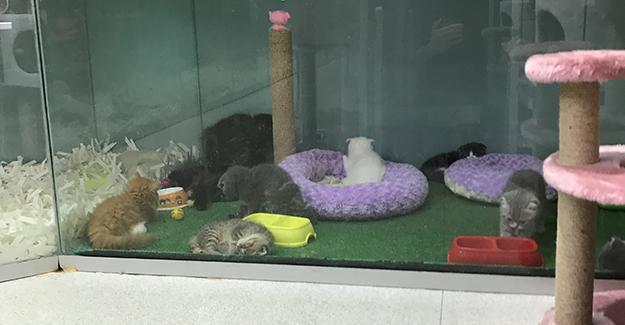Animals kept in poor conditions in pet shops in Turkey amid debate on new pet shop law
Cansu Şimşek – ISTANBUL

Thousands of cats and dogs are still waiting in poor conditions at pet shops, amid ongoing debate over a new draft law banning pet shop owners from displaying them in stores.
Critics of the draft law say it does not go far enough, arguing that animal sales should be banned completely.
If the new law passes in parliament, potential buyers of cats and dogs will have to choose their future pets from catalogues, as pet shop owners will not be allowed to keep animals on display in their stores anymore.
According to the Forestry and Waters Affairs Ministry’s new regulation, cats and dogs will be bred at specially designated sites with a suitable light and heat balance, while pet shop owners will only be able to display fish and bird species in their stores.
However, animal rights activists argue that the new law should ban animal sales completely and the regulation will lead to an increase in “under-the-counter” production of pets.

“There are a number of serious problems regarding pet shops,” said the deputy chair of the human rights commissions of the Istanbul Bar Association, lawyer Deniz Tavşancıl Kalafatoğlu, adding that it was very difficult for the authorities to “properly inspect” pet shops.
“The European Union Constitution regards animals as ‘creatures with feelings.’ Every country has special regulations for animals, removing the status of ‘property’ from them. But we in Turkey still insist on commodifying animals,” Kalafatoğlu said.
“People’s feelings are exploited by displaying animals [in pet shops]. The sale of animals should be completely banned. There should not be any ‘sales from a catalogue.’ We don’t know the kind of environments where the animals would be kept in this instance. The import of animals from abroad should be banned. Ownership based on volunteering should be encouraged,” said another lawyer at the Istanbul Bar Association, Hülya Yalçın.

According to Barış Şengün, the Istanbul representative of the Animal Rights Confederation, the new law will lead to an increase in clandestine selling of animals.
“There are various kinds of risks associated with choosing animals from catalogues. Which farm is the animal coming from? Are you sure that the animal you get is the one you chose in the catalogue? Who does the provider farm belong to?” Şengün said, also voicing suspicion that producers can be properly inspected as there is already a problem with the checking of animal shelters linked to local municipalities.
“The conditions at animal shelters are heartbreaking. There are already problems regarding investigation and coordination of these places. So how is it going to be the case that potential buyers will inspect production farms all across the country?” he said.
Hüseyin Güven, who has been running a pet shop for 14 years, said his shop does not sale animals, but only animal products.
“We don’t sell our friends … Profit is made from the sale of cats and dogs at a ratio of three to one. Sales are needed by our sector, of course, but unless the right conditions are provided we cannot defend the sale of animals in this way. The real problem is how and from where the sold animals were bred,” Güven said.
 Thousands of cats and dogs are still waiting in poor conditions at pet shops, amid ongoing debate over a new draft law banning pet shop owners from displaying them in stores.
Thousands of cats and dogs are still waiting in poor conditions at pet shops, amid ongoing debate over a new draft law banning pet shop owners from displaying them in stores. 
